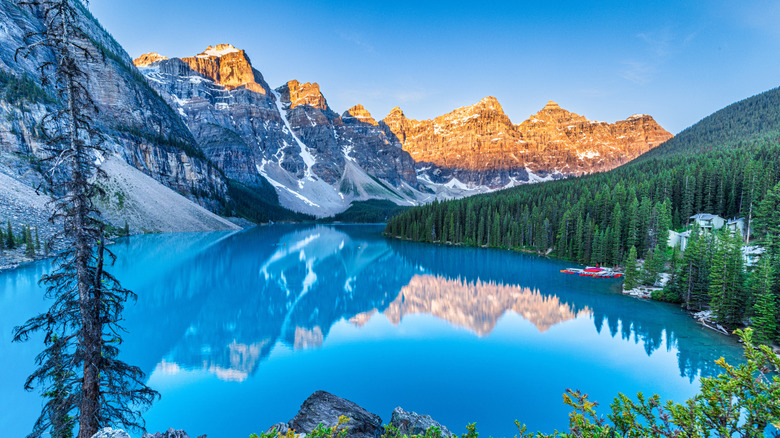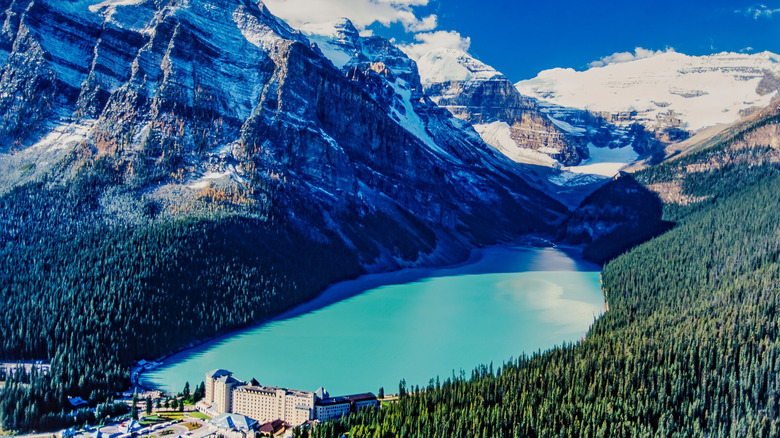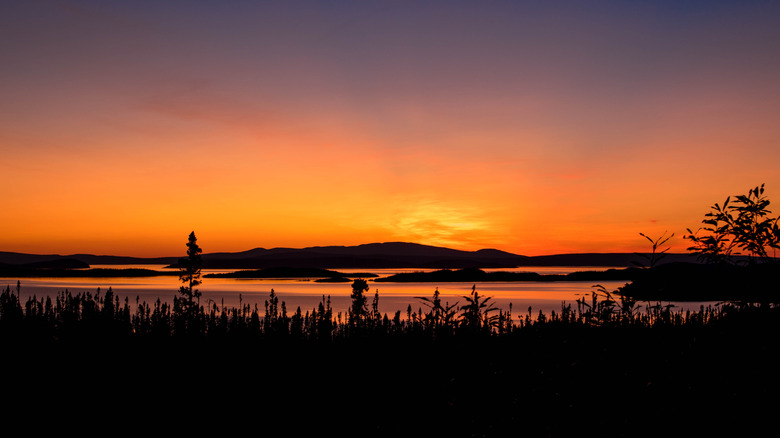The Most Lake-Filled Country In The World Is A Popular Vacation Destination And Water Lover's Paradise
What's more quintessentially American than a summer day spent by the lake? It feels like everyone's within striking distance of an epic watering hole, and with over 100,000 of them, you'd think the U.S would be leading the lakeland charge globally. But another popular vacation destination holds that title. Canada, the U.S.'s northerly neighbor, has eight times as many, making it the most lake-filled country in the world and a water lover's paradise.
With a whopping 879,800 lakes, Canada dwarfs the nearest competition (Russia) by over 600,000. Going even further, the Land of Maple Syrup has more lakes than the rest of the world combined, with 62% of the planet's 1.42 million lakes over the size of 25 acres falling within its borders. Including the lakes smaller than that, there are at least 117 million in the world, with around 2 million of them calling Canada home.
Of course, Canada is already known for its tremendous natural wonders (maybe less known is the wild woodland of Canada's "Sasquatch Capital," but hey, there's something for everyone). Its soaring mountains, dramatic coastal regions, and mesmerizing forests are iconic the world over. But water lovers of every kind have almost unlimited opportunity in Canada. From the typical summer shenanigans to winter-time frozen lake frolics, the possibilities are endless.
Which are the best lakes in the most lake-filled country in the world?
Canada is a massive and predominantly wild country. Because of this, many of its lakes are fairly obscure, with multiple found in remote regions almost unreachable by traditional methods. But there are some epic choices for any time of the year, regardless of whether you're looking for a chilled-out summer spot or an extreme sports heaven. Wherever you're heading, just ensure you take the right precautions when on the water.
Lake Louise, nestled among the peaks above Banff, is known as Canada's most beautiful lake and unarguably the most famous of them all. The spectacular glacial lake's turquoise waters are world-renowned and have been for well over a century. The lake is a stunning focal point for skiers, hikers, and all outdoor enthusiasts year-round. Because of its glacial origins, the water remains cold, even in the summer. But you'll still find revelers in canoes and kayaks. In winter, the lake is known to freeze, making it an unforgettable place to lace up some ice skates. It's vital to make sure the lake is safe to do so first, so ask around before grabbing your blades. Unfortunately, the temperature also limits the amount of fish that can live in its waters, so don't hold your breath for too many catches.
Less well known is the tremendously unique Manicouagan Reservoir. Located in Central Quebec, the peculiar 40-mile-wide ring-shaped lake was formed at least 214 million years ago when a meteor struck the Earth. The lake itself was helped along by the addition of a dam, which flooded several smaller lakes formed around the perimeter of the crater. Unlike Lake Louise, fish are abundant in these waters. When winter temperatures plummet, it's a surreal destination for snowshoeing and icefishing, while summer is perfect for paddleboarding and canoeing. Don't be fooled into thinking it'll be easy to kayak the whole way round. The crater lake is so big you'd never feel the turns.
How to plan a trip to the most lake-filled country in the world
Getting to Canada is easy. Finding some of the country's most remote lakes isn't. Of course, plenty of the country's most iconic spots are super accessible. The first mentioned above, Lake Louise, is located in one of the most popular tourist destinations in the country. You'll still need to fly into an airport like Calgary and either drive or take public transport. That'll take around two hours and will unlock multiple spectacular lakes on top of Lake Louise.
To get to one of the more remote spots, like the Manicouagan Crater Lake, you'll need to fly into an airport like Quebec City before embarking on an epic nine-hour road trip through the Canadian countryside. It'll be worth it for the adventure alone. Many of the lakes are even more remote, with little or no roads, public transport, or air connections. Don't set off on a trip like this without checking the logistics of getting there.
If you're keeping things frugal, this underrated Canadian airline has budget-friendly prices to both Calgary and Quebec. You'll be thankful, as prices for hotels and other accommodations in many parts of Canada can soar. Costs for activities on the lake will also vary drastically. Hiring a canoe on Lake Louise will likely trump the prices in a more remote lake, so keep this in mind when planning.


